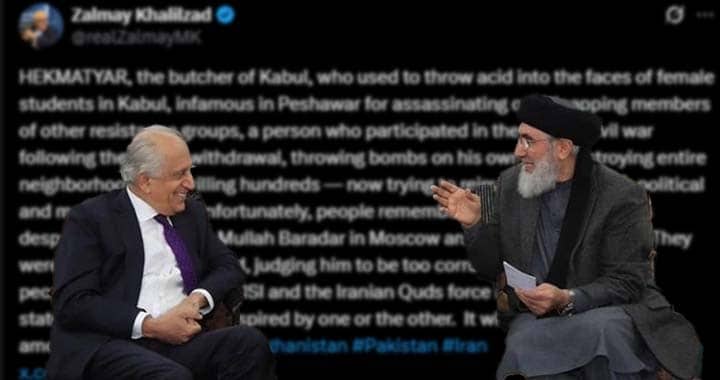Former United States special envoy for Afghanistan reconciliation Zalmay Khalilzad reignited debate over Afghanistan’s turbulent past by sharply criticizing Gulbuddin Hekmatyar, the leader of Hezb-e-Islami, describing him as the “Butcher of Kabul” and holding him responsible for some of the country’s most violent chapters.
In a post on X, Khalilzad accused Hekmatyar of wartime atrocities that included acid attacks on female students in Kabul, kidnappings in Peshawar, and the indiscriminate shelling of Kabul during the 1990s civil war that left entire neighborhoods destroyed and hundreds dead.
The former US envoy further alleged that Hekmatyar had recently attempted to negotiate a side deal with Taliban deputy leader Mullah Baradar in Moscow, but was rejected as “too corrupt” and “a traitor to his people.” He also claimed Hekmatyar has long relied on external patrons, including Iran’s Quds Force, to sustain his influence.
“Hekmatyar, the butcher of Kabul, infamous for targeting his own people, destroying Kabul and causing mass suffering — is now trying to reinvent himself as a political and moral authority,” Khalilzad remarked.
The intervention has renewed scrutiny of Hekmatyar’s controversial career. Once a leading mujahideen commander against the Soviet Union, his faction was later blamed for devastating Kabul through relentless rocket fire during the civil war. His name remains synonymous with the bloodshed that engulfed Afghanistan in the 1990s.
Although Hekmatyar has sought to reposition himself as a statesman in recent years, public distrust continues to overshadow his political ambitions. His criticism of the Taliban regime often centered on corruption, authoritarian restrictions, and poor governance has drawn attention, but observers argue that his own record of violence undermines his credibility.
Khalilzad’s sharp rebuke highlights how Afghanistan’s unresolved past continues to shape its present politics, with figures like Hekmatyar struggling to secure legitimacy amid widespread public skepticism.





